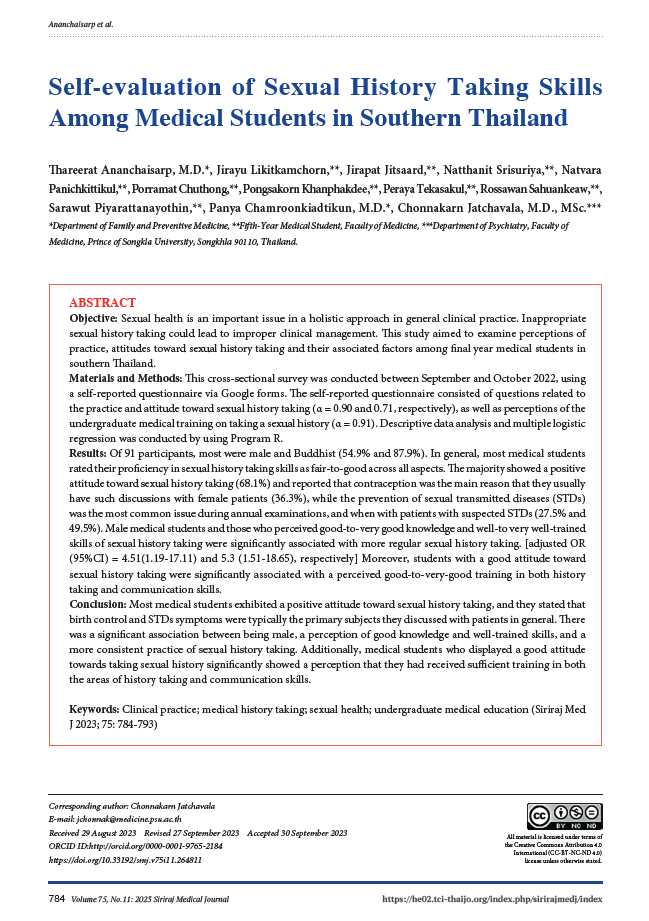Self-evaluation of Sexual History Taking Skills Among Medical Students in Southern Thailand
DOI:
https://doi.org/10.33192/smj.v75i11.264811Keywords:
Clinical practice, Medical History Taking, Sexual health, Undergraduate medical educationAbstract
Objective: Sexual health is an important issue in a holistic approach in general clinical practice. Inappropriate sexual history taking could lead to improper clinical management. This study aimed to examine perceptions of practice, attitudes toward sexual history taking and their associated factors among final year medical students in southern Thailand.
Materials and Methods: This cross-sectional survey was conducted between September and October 2022, using a self-reported questionnaire via Google forms. The self-reported questionnaire consisted of questions related to the practice and attitude toward sexual history taking (α = 0.90 and 0.71, respectively), as well as perceptions of the undergraduate medical training on taking a sexual history (α = 0.91). Descriptive data analysis and multiple logistic regression was conducted by using Program R.
Results: Of 91 participants, most were male and Buddhist (54.9% and 87.9%). In general, most medical students rated their proficiency in sexual history taking skills as fair-to-good across all aspects. The majority showed a positive attitude toward sexual history taking (68.1%) and reported that contraception was the main reason that they usually have such discussions with female patients (36.3%), while the prevention of sexual transmitted diseases (STDs) was the most common issue during annual examinations, and when with patients with suspected STDs (27.5% and 49.5%). Male medical students and those who perceived good-to-very good knowledge and well-to very well-trained skills of sexual history taking were significantly associated with more regular sexual history taking. [adjusted OR (95%CI) = 4.51(1.19-17.11) and 5.3 (1.51-18.65), respectively] Moreover, students with a good attitude toward sexual history taking were significantly associated with a perceived good-to-very-good training in both history taking and communication skills.
Conclusion: Most medical students exhibited a positive attitude toward sexual history taking, and they stated that birth control and STDs symptoms were typically the primary subjects they discussed with patients in general. There was a significant association between being male, a perception of good knowledge and well-trained skills, and a more consistent practice of sexual history taking. Additionally, medical students who displayed a good attitude towards taking sexual history significantly showed a perception that they had received sufficient training in both the areas of history taking and communication skills.
References
World Health Organization. Sexual health [Internet]. Geneva: WHO; 2006 [cited 2022 Aug 2]. Available from: https://www.who.int/health-topics/sexual-health
Brookmeyer KA, Coor A, Kachur RE, Beltran O, Reno HE, Dittus PJ. Sexual history taking in clinical settings: a narrative review. Sex Transm Dis. 2021;48(6):393-402. DOI: https://doi.org/10.1097/OLQ.0000000000001319
Zannoni R, Dobberkau E, Kaduszkiewicz H, Stirn AV. Addressing sexual problems in German primary care: a qualitative study. J Prim Care Community Health. 2021;12:21501327211046437. DOI: https://doi.org/10.1177/21501327211046437
Verhoeven V, Bovijn K, Helder A, Peremans L, Hermann I, Van Royen P, et al. Discussing STIs: doctors are from Mars, patients from Venus. Fam Pract. 2003;20(1):11-5. DOI: https://doi.org/10.1093/fampra/20.1.11
Wimberly YH, Hogben M, Moore-Ruffin J, Moore SE, Fry-Johnson Y. Sexual history-taking among primary care physicians. J Natl Med Assoc. 2006;98(12):1924-9.
Ariffin F, Chin KL, Ng C, Miskan M, Lee VK, Isa MR. Are medical students confident in taking a sexual history? An assessment on attitude and skills from an upper middle income country. BMC Res Notes. 2015;8:248. DOI: https://doi.org/10.1186/s13104-015-1220-y
Ashton MR, Cook RL, Wiesenfeld HC, Krohn MA, Zamborsky T, Scholle SH, et al. Primary care physician attitudes regarding sexually transmitted diseases. Sex Transm Dis. 2002;29(4):246-51. DOI: https://doi.org/10.1097/00007435-200204000-00011
Jatchavala C, Vittayanont A. Post-traumatic stress disorder symptoms among patients with substance-related disorders in the restive areas of south Thailand insurgency. Songkla Med J. 2017;35(2):121-32. DOI: https://doi.org/10.31584/smj.2017.35.2.694
Jatchavala C, Pitanupong J. Resilience in medical doctors within the areas of the Southern Thailand insurgency. Siriraj Med J. 2019;71(3):228-33. DOI: https://doi.org/10.33192/Smj.2019.35
Planned Parenthood. Sexual Orientation [Internet]. Washington, DC: Planned Parenthood Federation of America [cited 2022 Oct 9]. Available from: https://www.plannedparenthood.org/learn/sexual-orientation/sexual-orientation
Jatchavala C, Pitanupong J. Self-perceived incompetence in psychiatric practice of practitioners from Southern Thailand: one year following graduation. Walailak J Sci & Tech. 2021;18(12):10408. DOI: https://doi.org/10.48048/wjst.2021.10408
Jatchavala C, Sangkool J. A survey concerning the psychiatric practices of medical doctors, who graduated from Prince of Songkla University in 2017. J Ment Health Thai. 2019;27(1):52-64.
Nagendrappa S, de Filippis R, Ramalho R, Ransing R, Orsolini L, Ullah I, et al. Challenges and opportunities of psychiatric training during COVID-19: early career psychiatrists' perspective across the World. Acad Psychiatry. 2021;45(5):656-7. DOI: https://doi.org/10.1007/s40596-021-01482-3
Orsolini L, Jatchavala C, Noor IM, Ransing R, Satake Y, Shoib S, et al. Training and education in digital psychiatry: a perspective from Asia-Pacific region. Asia Pac Psychiatry. 2021;13(4):e12501. DOI: https://doi.org/10.1111/appy.12501
Rittirong P, Thirapatarapong W, Thanakiatpinyo T. Patients’ Need for Sexual Counseling in the Cardiac Rehabilitation Service. Siriraj Med J. 2023;75(7):522-8. DOI: https://doi.org/10.33192/smj.v75i7.263195

Published
How to Cite
License
Copyright (c) 2023 Siriraj Medical Journal

This work is licensed under a Creative Commons Attribution-NonCommercial-NoDerivatives 4.0 International License.
Authors who publish with this journal agree to the following conditions:
Copyright Transfer
In submitting a manuscript, the authors acknowledge that the work will become the copyrighted property of Siriraj Medical Journal upon publication.
License
Articles are licensed under a Creative Commons Attribution-NonCommercial-NoDerivatives 4.0 International License (CC BY-NC-ND 4.0). This license allows for the sharing of the work for non-commercial purposes with proper attribution to the authors and the journal. However, it does not permit modifications or the creation of derivative works.
Sharing and Access
Authors are encouraged to share their article on their personal or institutional websites and through other non-commercial platforms. Doing so can increase readership and citations.










